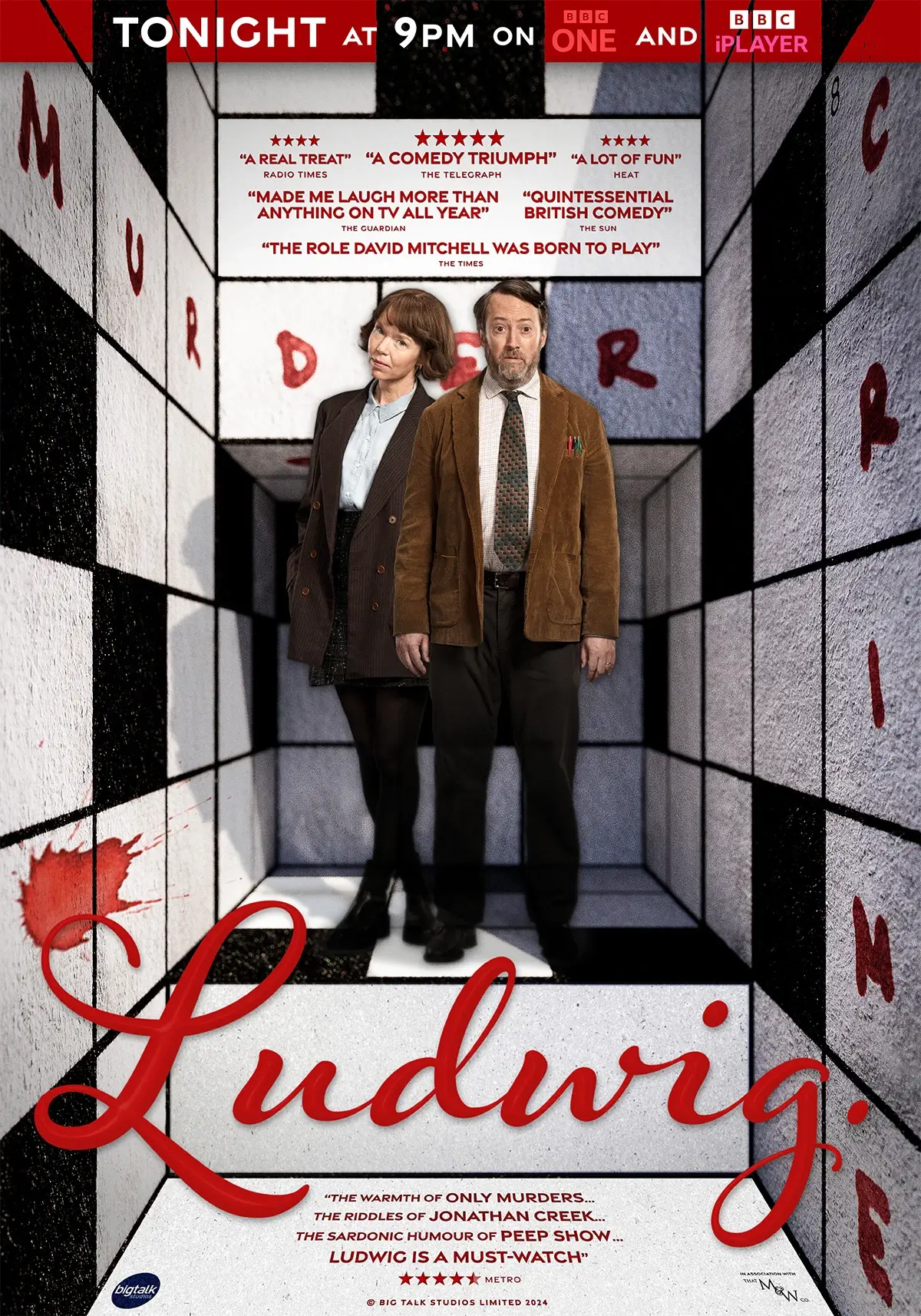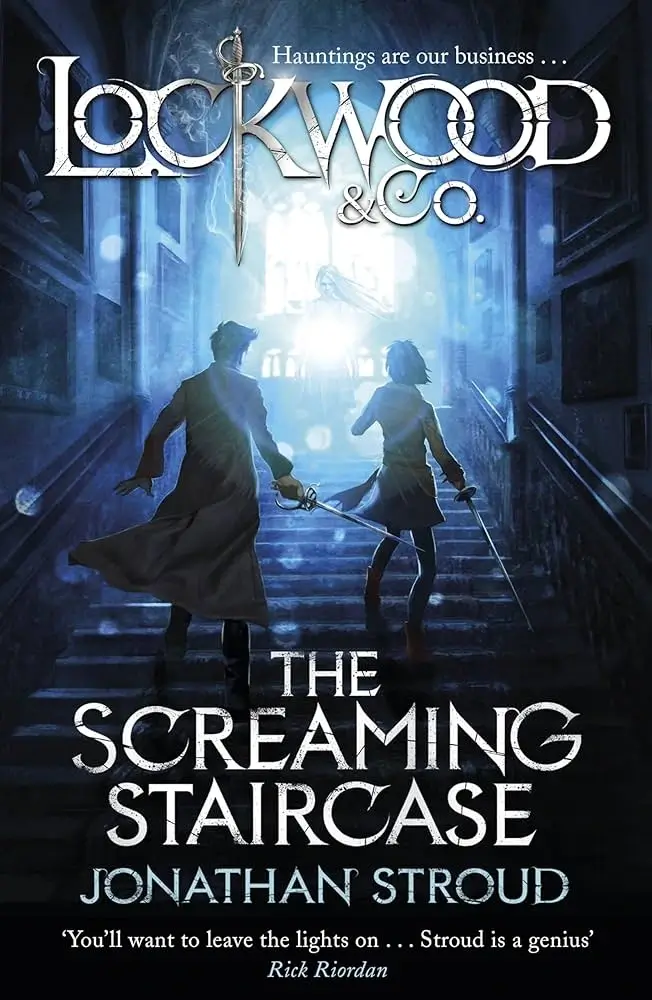Sometimes, a string of coincidences forces me to watch a TV show. Ludwig would disagree, of course. Three related coincidences means they’re not coincidences anymore! So who knows, maybe the gods of TV worked their mysterious ways to compel me to watch this show.
More specifically, though, I happened to see a teaser for the show Ludwig (BBC; 2024) on YouTube, then my sister asked out of the blue if I’d seen the show, and then a few days later she had seen all episodes herself and told me I should watch it and give my thoughts.
And so I did. This article will contain my brief thoughts—not really a proper review—on the show. This is spoiler free, which is another reason for its brevity.
What’s the idea?
Ludwig (John) is a middle-aged man and the pseudonym of a legendary puzzle-setter. All his life, he’s stayed indoors to invent fun puzzles for others to solve. Until he gets a phone call from a friend asking him to travel all the way across the country, immediately, because something bad has happened.
As it turns out, his twin brother (James) has disappeared, who is a chief inspector at the police. The only way to figure out what happened is to have John impersonate his brother and basically investigate the police from within.
Soft sleuthing
My sister’s main “gripe” with the show was that you can’t really solve the case along with Ludwig.
I agree.
It feels like you’re almost getting all the information and able to follow along, but you’re always just shy of it. The first and last episode are especially bad in this regard; those in-between are much better at giving you the full case and train of thought.
After watching the first three episodes, I told my sister: “It always feels like you’ve fast forwarded over the 5 most important minutes.”
The question, of course, is whether this is bad. The show is clearly set up to be a more comical and light-hearted take on a detective show. The actual solutions to murder cases are almost an afterthought. If you came into this show expecting solid cases that you might figure out by puzzling along … you will be disappointed. If you came in expecting a humorous detective story … you will have a great time!
I guess I’d call that “soft sleuthing”. Yes, you can play along, you might even guess the who and the why (as I did several times). But it would be nothing more than that: a voluntary guess. A nice added bonus, especially if you’re willing to pause and study a freeze frame for a few seconds ;)
Funny in the right way
When people set out to create a comical story, they often overdo it. It becomes a series of stand-up jokes, where nothing matters and characters are paper-thin. Think of the latest Marvel instalments where they are supposedly “saving the world”, but all you get is quips and sarcastic remarks that undermine the whole story. This, ironically, isn’t that funny.
In reality, actual humor comes from realistic situations. Jokes are funnier if they are contrasted with serious or sad moments. Jokes are better if they are organic and naturally arise from the way you set up a scene.
This, I think, Ludwig does very well. There is a serious story here. The drama of a family whose father suddenly disappeared. The drama of John’s isolated life and struggle getting out of his shell (literally or figuratively). Actual murder, the possibility of a serious conspiracy at the police, and so forth.
But it manages to twist those realistic situations into funny moments.
Because you care about Ludwig and there’s tension about being “found out” by the police, every scene—no matter how ordinary otherwise—suddenly becomes one with awkward conversations, silly phrases, and tense jokes.
Because you care about that family, any moments between them offer good and organic jokes. There was never a time I felt something was “unnatural” to say for anyone. Even in sad scenes, jokes aren’t misplaced. I know, perhaps more than most, that this is precisely the moment where people will try to cheer each other up that way.
One-liners or snide remarks are rarely good jokes. Funny situations and organic setups automatically lead to really good, sustained, unexpected jokes. Because they are the reason we evolved to have a sense of humor in the first place.
There’s a good balance of both here. Although I think it could have leaned a little more on the unserious side, because of the “soft sleuthing” I mentioned. Now it sometimes seemingly floats between the two, uncertain whether it wants to actually solve murders or make jokes. To the point I once wondered if the detectives were making a joke … or if this was literally the solution to the murder.
As usual, if you try to do everything, you practically do nothing. The instances in which I felt this were rare, though.
On top of that, David Mitchell is just perfectly cast. (The whole cast is nice, by the way, but I specifically like him in the role.)
Filmography
Finally, a compliment to the filmography. The series looks, sounds, and feels really good and consistent. More clean and professional than lots of other (more expensive!) things I’ve seen in recent years. That just goes to show it’s more important to have a strong vision and stick to it, than to throw loads of special effects or expensive sets at it.
Additionally, it does some fun stuff with one-take shots and (drone?) overview shots. Such as the very first scene in the entire show: you see an apartment building from the outside as it switches between rooms, you see people walk around and leave, and then you return to one room and there’s suddenly a dead body. All in one take (seemingly), all without entering the building itself. And it’s a really strong opening.
I wish it’d done more like it. I always like people thinking outside the box and really experimenting with how to film a story. Authors have long understood this, as most of them have wildly different writing styles or general structures to their stories. They pick whatever weird approach works best for their specific story. But I feel visual media still resort to doing basic blocking and quick cuts between scenes too often.
Perhaps it could’ve introduced the “puzzle” aspect more. Yes, Ludwig thinks in puzzles and there are some clear cases where he explains how that helps. But it’s not as prevalent as I would have thought, especially considering what a potent idea that is. They could’ve done those Sherlock Holmes kinds of things, with neat visualizations of options he’s considering and possible puzzle paths and what not. But I’m probably asking for too much now—the puzzle aspect was integrated well enough as it is.
Conclusion
I think Ludwig is a really good show. The technical side (audio, video, etcetera) is good. The cast is good. The script necessitates a nice variety of locations, shots and scenes. (Instead of being stuck inside the exact same room at the police station all the time.) Episodes aren’t too short or too long: at the end of season 1, I don’t feel like we ended abruptly, but I do still want more.
There’s an overarching story (his brother’s disappearance, impersonating him) that is just great for tying everything together. It often gets way more attention than any detective work. If you can accept that, you will like the show. If you expected interesting cases to solve alongside Ludwig, you will be disappointed.
Though, as stated, the middle episodes are much “meatier” in that regard than the first and last. That’s to be expected, though. I have the same “problem” any time I wrote my own series of books: the first one loses too much time to setup and introductions, while the last one loses too much time to tying all loose ends.
It’s this overarching story, of course, that also presents the cliffhanger on which season 1 ends. Season 2 is already confirmed and I’ll surely try to catch it when it comes out.
Even though I feel the ending would have worked too, and potentially been even stronger, without that final shot/scene. Too often, cliffhangers are nothing more than showing something surprising or new … which doesn’t mean anything specifically. It’s so vague and open to interpretation that it might as well not have been there. After writing and reading so many stories, I just shrug whenever that happens now.
That’s all I can say about that without giving spoilers.



